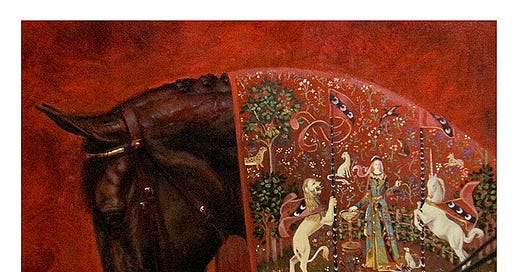You're called to be meek. That doesn't mean what you think it does.
Tracing the forgotten history of a noble virtue
Editor’s note: this is a guest post by my friend . If you enjoy it, please go and subscribe to his publication The Old South Repository. -Johann
The knight is a man of blood and iron, a man familiar with the sight of smashed faces and the ragged stumps of lopped-off limbs; he is also a demure, almost maidenlike, guest in a hall, a gentle, modest, unobtrusive man. He is not compromise or happy mean between ferocity and meekness; he is fierce to the nth and meek to the nth. The man who combines both characters – the knight – is not a work of nature but of art; of that art which has human beings, instead of canvas or marble, for its medium.
― C.S. Lewis, The Necessity of Chivalry
A false understanding of meekness has left us wandering and confused.
Christians have experienced the removal of prayer from schools, have observed the erection of satanic statues in public spaces, and have been coerced into compromising their beliefs.
This retreat has filled many Christians with righteous anger, only to be met by pastors and priests advising passivity, claiming there is little to be done but to watch as evil flourishes. This call for inaction is often justified by a misinterpretation of the Christian virtue of meekness. Meekness, however, is not about passive acceptance of wrongdoing.
Instead, it signifies controlled strength and humility, much like the well-trained war horses of ancient Greece, powerful yet disciplined, ready to act with wisdom and courage.
To understand meekness, we must first explore its origin. The word “meek” is often misinterpreted as weakness or docility, but its true meaning is far more profound.
Our modern word ‘meek’ finds its origin in the Old Norse word mjukr, which means "soft, pliant, gentle.”1 ‘Gentle’ - the counterpart of meek - is derived from the Old French gentil/jentil which means, "high-born, worthy, noble, of good family; courageous, valiant; fine, good, fair.”2 Already, we see an interesting contrast emerge between the two terms. This contrast is indicative of the underlying complexity; neither of these words fully captures the Greek term used in Scripture.
Keep reading with a 7-day free trial
Subscribe to Becoming Noble to keep reading this post and get 7 days of free access to the full post archives.





